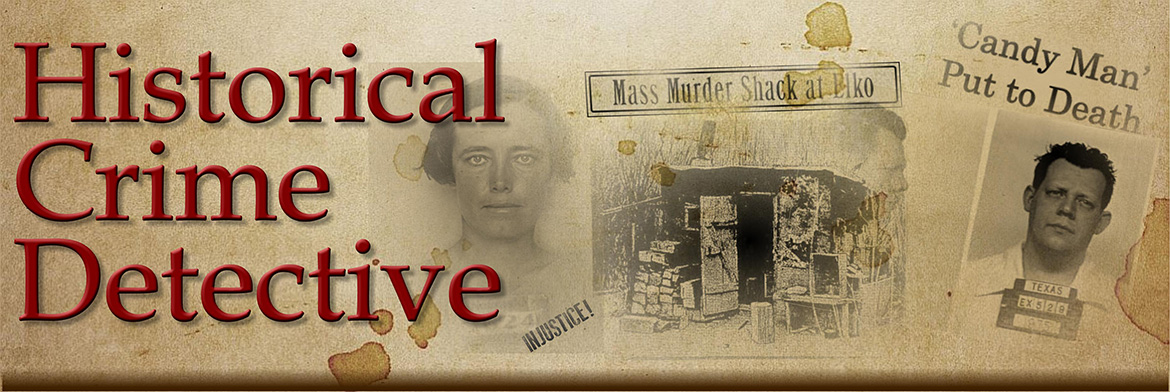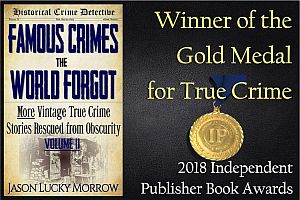The Knight Family Massacre, 1958
Home | Mug Shot Monday, Short Feature Story | The Knight Family Massacre, 1958On Tuesday, April 22, 1958, twenty-nine year-old David F Early was freed from Fort Leavenworth Federal Penitentiary where he served time for aggravated robbery. In a pre-release letter to the parole board, Early stated he wanted to return to his home state of Colorado where his attorney and ‘uncle,’ Merrill A. Knight, had befriended him and promised to help him upon his release from federal prison. In the letter, Early described Knight as “the only friend he ever had.”
Tap or click on thumbnail for pop-up image gallery.
From Kansas, Early traveled by bus to Denver where he registered at the downtown YMCA on Thursday, April 24. The following day, he took a taxi to Knight’s home located in the “posh” Greenwood Village suburb where he arrived around noon. Finding no one home, Early entered the house through an unlocked basement door and immediately began going through the home looking for money, jewelry, and valuable items he could later pawn for cash. But when he discovered Knight’s .22 caliber rifle in the back of a closet, Early loaded the bolt-action rifle, made himself comfortable in Mr. Knight’s favorite chair, and chain smoked cigarettes as he waited for the family of four to return home.
Later described by newspapers as a “ne’er-do-well,” David Early had been in and out of jail or prison for most of his life. In addition to his federal time, Early had served time in Pennsylvania, Oklahoma, and Colorado where he had completed a prison sentence in 1955, and then another in 1957.
It was during that time that Merrill A. Knight had become acquainted with his ‘distant relative,’ who he represented in court. Out of pity or a feeling of personal responsibility, the forty-seven year-old lawyer had taken an interest in the troubled young man who he had invited to his home several times in the past.
It was an unfortunate decision that led to a crime so horrible it would be compared to the Clutter Family murders that occurred in Holcomb, Kansas, nearly nineteen months later. Although prison doctors at Colorado State Penitentiary in Cañon City had diagnosed Early as a “dangerous psychopath” and included their findings in his prison file, it is unclear if Knight was aware of client’s condition.
Mrs. Regina Knight was the first to return home. With the rifle pointed at her, Early forced her to a bedroom where he tied her hands and feet. He told her he needed money. She said there was $60 in her purse. Early yelled at her that it wasn’t enough. He wanted more.
More would come.
As he was trying to squeeze more money out of her, Mrs. Knight’s two step-children walked through the door. When they saw their father’s former client pointing a rifle at them, they were too confused and too shocked to run back out of the house. He led fifteen-year-old Karen to her bedroom where he tied her to the bed with stockings. He then took seventeen year-old Kenneth to his mother’s room where he tied him up with stockings near the foot of the bed.
Not long after, Merrill Knight returned home sometime between 5:30 and 5:45 p.m. Like the others, David Early forced Knight into a third bedroom where he ordered the attorney to tie his own feet together. He then told him to lay flat on his stomach, but before he could tie his hands together, he saw Mr. Knight’s wallet, took it, and found $127 to put in his own pocket. He then bound the man’s hand together behind his back.
Early collected another $77 dollars from the family, and told them to stay still and he would leave when it got dark.
But then, something else happened.
Varian L. Ashbaugh, a forty-seven year-old contractor, had met with Knight at his office earlier that day. Knight was handling the legal matters of an important business transaction for Ashbaugh, who later gave the following statement to police.
“I had talked to Merrill earlier in the day about an important business transaction he was handling for me. He asked me to bring or mail the papers to him so he would get them before he left for Las Vegas Saturday morning. (The entire family was going).
“I forgot to mail the letter during the day, but I knew we were going to the Wilson’s for dinner, so. I decided to drop it off on the way. (A few minutes before six o’clock) I walked to the door and rang the bell. When there was no answer, I tried the door and it was unlocked. I pushed the door open a ways and saw this young man approaching.
“He was very polite and calm. I asked him if Mr. Knight was home, and he said, ‘Yes, hut he is in the bathtub.’
“I then asked him if Mrs. Knight was home and he told me she was busy. I then asked him if he would give the letter to Mr. Knight and he told me he would be glad to do so.
“He was casually dressed, and I thought he was probably someone the Knights had hired to watch their home while they were in Las Vegas.”
A few minutes after Ashbaugh left, Early went to check on his captives. During the distraction with Ashbaugh, Knight had gotten loose and lunged at a surprised Early who said, “I started shooting without thinking.” Knight was shot three times and died later that night.
Not wanting to leave witnesses behind after mortally wounding the father, Early then went to the mother’s bedroom, stepped over Kenneth, and shot Regina Knight once in the head. Stepping back over the boy, he went to Karen’s room, and shot her once in the head.
In the short amount of time between moving from one bedroom to the next, Kenneth freed himself and was running out of the house when Early fired one bullet at him. He missed, and the rifle jammed.
Kenneth ran to the Wilson’s house, where they were hosting the dinner party Ashbaugh was attending. Inside, the high school senior screamed, “Mother and dad have been shot!”
Several of the men ran outside and noticed a car leaving the Knight residence. William Pumpelly and Ashbaugh got into their car and gave chase. Armed with only an empty shotgun, they did the only thing they could; they rammed their car into the stolen vehicle, pushing it into the ditch. Early jumped out and started running but was soon overpowered by Pumpelly and Ashbaugh. Others from the party, including Kenneth, soon arrived, and although it is not clear from newspaper reports, someone held the unloaded shotgun on Early. Thinking it was loaded, he stopped struggling, sat on the ground, and smoked a cigarette.
Officers soon arrived, as did a newspaper reporter who asked Early why he shot the Knights.
“Because I needed money,” Early answered.
“What for?” the reporter asked.
“What does anybody need money for?” Early snapped back.
Early was taken to the Arapahoe County Jail where he first dictated a confession taken in shorthand, and then wrote out another one by his own hand.
“Early, pasty-faced and chain smoking, smiled as he listened to officers describe the crime to reporters,” the Associated Press reported in an article distributed nationwide. Early was also interviewed by a newsman for a Littleton, Colorado radio station, which broadcasted Early’s interview later that day.
“After his radio interview, Early told the newsman: I did a favor for you on the radio, now get me some smokes,” the AP report continued.
In a separate story released by the Associated Press that day, Sheriff Charles Foster quoted Early as saying: “I’d do it again under the same circumstances.” Foster then referred to the letter Early had submitted to the Leavenworth parole board in which he wrote, “Knight was the only friend he ever had.”
It was a character revealing point to make that only increased the public’s anger for David Early.
On his first night in jail, Early slept soundly that night and ate everything he was offered the following day. He rejected any kind of reading material, including a Bible. He only wanted cigarettes. When a jailer gave him a half-a-pack of his own, Early grabbed them and never said ‘thank-you’ as he turned to walk away.
On December 3 of that same year (1958), a jury only needed twenty-five minutes to return with a guilty verdict and the judge sentenced him to death. During the short trial and throughout the appeals, Early’s legal battle was fought between psychiatrists for the state, and those for the defense. The state won each time and Early’s execution was set for August 11, 1961.
During his thirty-two months on death row, no visitor ever came to see him and none of his relatives wrote him a letter.
On his last evening alive, the warden went to his cell and read aloud the death warrant. Early was then taken out “and guided up the ramp to the ‘penthouse’ where the hexagonal gas chamber was located. He was ordered to strip down and given prison issued white shorts to wear inside the chamber. After he was seated and strapped into the steel chair, Early said out-loud, “I’m sorry I did it.” A Catholic priest administered last rights. His final statement was, “I hope God will forgive me.”
At 7:59 pm, the door was sealed. One minute later, the sodium cyanide pellets dropped into a vat of sulfuric acid. As the room filled with white gas, Early tried to hold his breath. He lasted for about a minute then compulsively took a deep breath and was unconscious within ten seconds. At 8:05, his body was wracked with convulsions and then he was still for two minutes. He was pronounced dead at 8:07 pm.
– – – – – # # # – – – – –
True Crime Book: Famous Crimes the World Forgot Vol II, 384 pages, Kindle just $3.99, More Amazing True Crime Stories You Never Knew About! = GOLD MEDAL WINNER, True Crime Category, 2018 Independent Publisher Awards.
---
Check Out These Popular Stories on Historical Crime Detective
Posted: Jason Lucky Morrow - Writer/Founder/Editor, March 20th, 2020 under Mug Shot Monday, Short Feature Story.
Tags: 1950s, Colorado, Execution, Mass Murders













